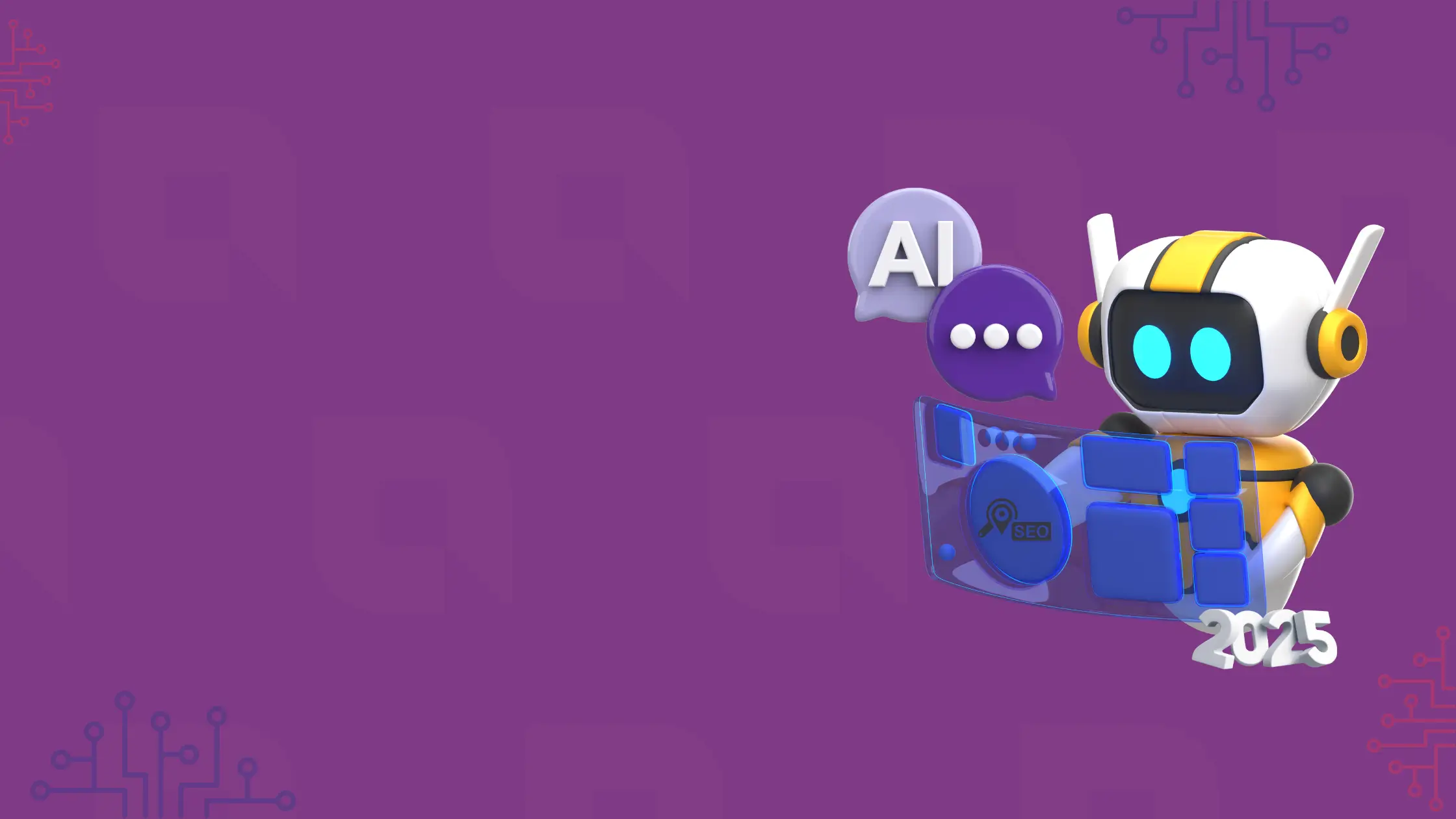Contact us
Are you looking to connect with a team that can bring AI to your SEO? Reach out to Lets Nurture today for more information on what comes next.


03
Apr. 258
VIEWSGroundbreaking AI technologies are rapidly changing how search engines operate. SEO experts and marketers are having to learn, evaluate, and adapt emerging SEO AI strategies to different websites, apps, and social media. There are many ways in which AI is impacting SEO best practices, including creating more sophisticated, nuanced search engine optimization techniques.
Here is how AI is changing the future of SEO in 2025. The years ahead in SEO will see some revolutionary changes.
The world’s biggest search engines are using AI algorithms to deliver more accurate, context-aware search results.
Every minute, 5.9 million searches are processed on Google alone. This adds up to 8.5 billion searches per day, many of which are demonstrably influenced by AI.
If you’re an SEO professional who is not interested in AI or who refuses to respond to the dramatic changes artificial intelligence has brought forth to search engine optimization, you are likely losing ground in rankings.
Google and other search engines are using AI-driven algorithms, such as RankBrain and BERT specifically to understand search intent. AI can analyze user behavior and content relevance more precisely than non-AI keyword-matching algorithms can. AI can also examine a user’s prior search history and preferences to further optimize and personalize results.
From an SEO perspective, this requires producing higher quality, context-rich content.
AI voice recognition tools are transforming how voice search optimization is carried out by marketers.
Voice search queries are known to be longer, often question-based, and more conversational. SEO strategies have already shifted to more natural language content.
AI uses natural language processing, or NLP, to interpret the meaning behind a search query beyond simply recognizing keywords as search engines used to. This has given search engines the chance to better comprehend synonyms and semantic relationships.
In response to such queries, search engines are producing human speech and addressing user questions directly with AI-generated content.
Therefore, be sure to use long-tail keywords and more conversational phrasing.
AI is active in every SEO tool or software worth looking at, including digital marketing pillars like SEMrush and Surfer SEO.
From the perspective of a marketer, artificial intelligence can be used to discover high-performance keywords faster. This is done through a thorough analysis of competitors, trends, and search volumes. The result is targeted, effective content strategies.
AI can then take this and generate content outlines, content clusters, blog drafts, meta descriptions, and provide suggestions on what a brand’s SEO strategy should be. AI can also enhance various on-page elements, such as meta titles, descriptions, header tags, a content’s conversational tone, and structure.
This is all based on high-quality keyword research and using it to correspond to top-performing pages and algorithms.
From a technical standpoint, AI can manage and report on technical audits. A site can be evaluated for hundreds of weaknesses, including broken links, slow page speeds, crawl errors, and more. AI works significantly faster than manual checks.
AI can be used to run a predictive analysis. It can forecast trends, keyword performance, and content success rates. The idea with such an analysis is to provide insights and information that allow management to make proactive decisions rather than be restricted to being reactive.
With predictive analysis, emerging search trends based on real-time data can be found by AI. This helps content creators and marketers craft topics ahead of time, staying ahead of the curve and securing top-ranking positions earlier than your competition.
To this point, delving into another area of analysis is with competition. Real-time competitor tracking and strategy benchmarking with AI can identify keywords your competitors are ranking for and what content tactics they’re using.
AI can identify content gaps comparing your content to a competitor’s, providing marketers a chance to discover untapped keywords and fill topic voids.
AI better understands the relationship between words and concepts. This has rendered keyword stuffing obsolete and the importance of content lies in the context and meaning, and not what or how many keywords are used.
Use artificial intelligence to create clustering strategies, grouping related content around pillar pages. Build topical authority and improve internal linking by focusing on crafting comprehensive content ecosystems.
AI can run analyses on sentiment in user reviews, social comments, and other forms of content. This identifies content tone and can align your future SEO content strategy to audience expectations.
Make your content more accessible to search engines by optimizing schema markup. Enhance rich snippets, FAQs, product listings, and more. Focusing on structured data boosts will help to boost search engine visibility.
AI can assist in providing guidance on optimizing image metadata, alt text, and file formats.
AI tools can do the same for video content creation, generating video transcripts, optimizing meta tags, and more. See the difference in your video analytics comparing metrics before and after on video-sharing platforms, such as YouTube, Facebook, Instagram, TikTok, and more.
AI tools can look at search engine page results to understand content patterns, featured snippets, and keyword competition. Learn what content you need to seemingly match search engine preferences.
AI can identify when a page has a high bounce rate, if there are technical page issues, or if users appear to be dropping off in specific areas of the page. When you prioritize improving the user experience, it further strengthens your website’s SEO.
AI can be a way to identify and update outdated content. Maintain relevance. Refresh old posts with new data and improved structure.
AI tools can point out high-quality backlinks and evaluate link profiles. They can suggest anchor text and outreach strategies. Over time, this builds domain authority and strong search rankings.
Let AI take the lead in breaking language barriers and keeping your content accessible with multilingual translation. Do so while maintaining context and accuracy.
AI is immediately obvious in most search engine query results with Google’s Search Generative Experience. SGE delivers instant, relevant answers without a user having to browse multiple links and make a click.
Understandably, while this is great for the user, for brands looking to rank, it might mean you don’t receive the click you would have received 10-15 years ago and may mean, depending on your strategy, experiencing a significant drop in exposure.
SEO isn’t dead. Brands who thrive with SEO understand that it requires adaptation. AI is another adaptation that brands have to take. To rank one’s content pages in amongst SGE, schema markup, or towards the top of search engine results, it requires further optimizing what you’re doing.
AI algorithms are only going to get better as time goes on which means so will your content have to.
Organic traffic on search engines continues to be possible so long as a business is aware that AI’s going to dominate pages and rankings.
To all but guarantee a steady stream of traffic on specific keywords or content pages, consider what sort of SEO strategy you need. Focus not only on your preferences and your client’s preferences in content but also to what search engine AI algorithms expect.
Ignore keyword matching and focus on producing the best, most highly-targeted content you can.
Based on what’s happened so far, artificial intelligence is revolutionizing search engines and optimization from the ground up. It’s not a trend – AI is the future of SEO.
As search engines are refining how they deliver their services, marketers must respond accordingly.
SEO as we know it may not exist as it is in 5-10 years. Things are changing fast and due in large part to how AI is progressing.
While there are so many ways to dissect the impact of AI on SEO, for a business who wants to future-proof, zero in on high-quality content that is fine-tuned to optimal search intent, language, and a refusal to rely on traditional SEO tactics that may or may not work in a few years.
Use AI to make your SEO more efficient and precise in the face of smarter, more advanced algorithms.
Explore AI-driven solutions that align with a brand’s goals. The right tools can save hours of work and improve your SEO results.
For a business, AI means an opportunity but also a challenge. If you want to stay relevant and competitive, AI can help give you an edge. While AI isn’t going to replace every traditional SEO strategy, a business can dramatically enhance what they are doing using AI in SEO.
Are you looking to connect with a team that can bring AI to your SEO? Reach out to Lets Nurture today for more information on what comes next.
